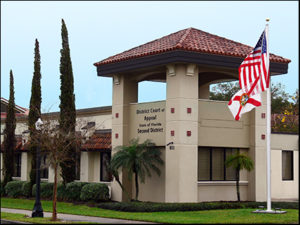Appeals 101: How do I initiate my Florida civil appeal?

The Second District Court of Appeals’ Clerk’s Office is in Lakeland, FL. But you don’t have to visit — you can file your filing fee by mail or online!
Timing of Your Notice of Appeal
In a standard civil case in Florida, one initiates an appeal by (1) filing a notice of appeal and (2) paying the filing fee. This applies to appeals from both final (see Fla. R. App. P. 9.110) and non-final (see Fla. R. App. P. 9.130(b)) orders. You have 30 days from the date your ordered is rendered to file your notice (stay tuned for an upcoming Appeals 101 post on what “rendered” means for appellate purposes).
Format of Your Notice of Appeal
The notice is a simple document — it does not contain argument, and it does not have to tell the court why you are appealing. Rather, it contains only basic contents — just enough to let the Court know what you are appealing and by what authority. Specifically, the notice must contain a caption, the name of the court to which the appeal is taken, the date of rendition, and the nature of the order to be reviewed. It is also critical to attach a copy of the order on appeal to the notice. The rules actually contain a sample notice to follow [.pdf].
Filing and Fees for Your Notice of Appeal
So how, and where, do you accomplish these filings? You go to the court that issued the order you want to appeal (sometimes referred to as the “trial court” or the “lower tribunal”). That is where you will file your notice of appeal. As far as fees, you’ll have to pay a fee both to that court, and to the appellate court. These days, both your notice of appeal and your filing fees to the courts can be paid online.
An example: You are appealing to the district court of appeal a final order of the circuit court. You must file your notice of appeal with the circuit court clerk, along with a $100 filing fee. You may also have to pay other small handling fees, such as a $2 “certification” fee, or credit card fees. Your notice of appeal will be sent to the district court of appeal. Upon receipt of the notice, the district court will assign your case a new number, and will often issue an order or notice stating that its filing fee has not been paid. You then must pay the district court an additional $300. Note that this procedure doesn’t really match up with the rules — before electronic filing, you were supposed to send your check to the circuit court clerk for both filing fees, but the rules haven’t caught up with technology, and the District Court does not take issue with you paying your filing fees after it assigns a case number, so long as you do it quickly. At that point, your appeal is fully initiated.
Filing a Notice of Appeal of a County Court Decision
The process is generally the same for appealing county court orders to the circuit courts, although the amounts of the fees vary slightly.
Filing a Notice of Cross-Appeal
And if someone else has filed a notice of appeal already and you want to file a cross-appeal, you’ll have to pay the appellate court $295.
For more information, look to the rules for final appeals and non-final appeals, and check out some of our other blog posts at flabarappellate.org.
What Happens if My Notice of Appeal is Late?
Be careful, because failing to file the notice of appeal on time will result in dismissal of your appeal for lack of jurisdiction. A late notice of appeal is not something that can be fixed. And while the courts are somewhat forgiving if you merely file in the wrong court or don’t pay the filing fee right away, they can still dismiss your appeal before you even get a chance to argue the merits if you don’t straighten out those defects fast.
Don’t Mess Around With Your Notice of Appeal
The rules of appellate procedure can be complicated and intimidating, but we’re here to help. Because the 30 day deadline comes fast, call our office for a consultation at 813-778-5161 if you are thinking of filing an appeal. Day 31 is too late. Count wrong, and it can be too late. Misunderstand rendition, and it can be too late. In fact, because understanding rendition can be tricky — and because your appeal can sometimes be stronger if you file a timely and authorized motion for rehearing, which has a shorter deadline — we recommend you contact appellate counsel within a day or two of learning of the order you want to appeal.
About Appeals 101
This post is part of our continuing Appeals 101 series. Click the link to find all of our posts on the basics of litigating an appeal.
